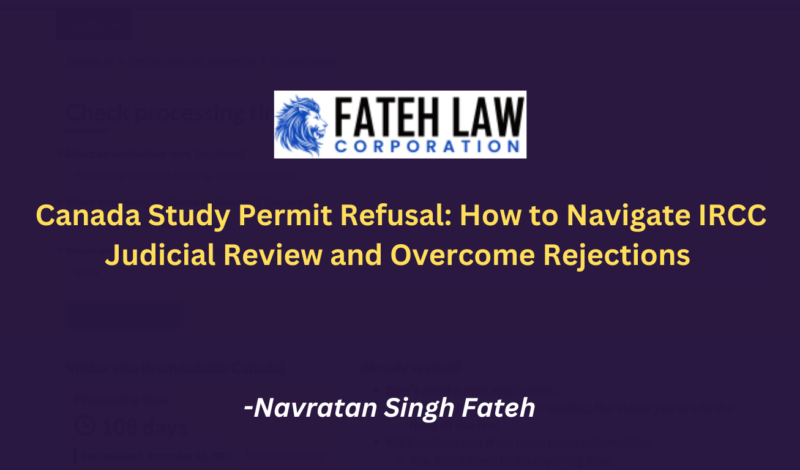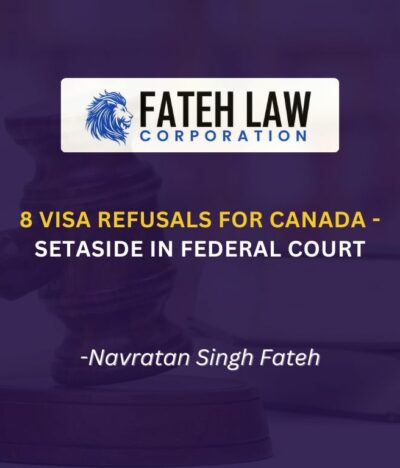Canada has long been a popular destination for international students, boasting world-class universities, a multicultural society, and numerous opportunities for academic and personal growth. However, if you are someone who wishes to pursue their education in Canada, obtaining a study permit is a crucial step—one that can sometimes be fraught with challenges. With our extensive experience in Canadian immigration, we have a deep understanding of the common reasons behind such decisions. We are equipped to guide applicants through the complexities of overcoming these challenges, ensuring a higher chance of approval.
Importance of Canadian Study Permits
A Canadian study permit is more than just a visa; it is a gateway to opportunities. It allows international students to legally reside in Canada while pursuing their education at designated learning institutions (DLIs).
Beyond academics, this permit often opens doors to part-time work opportunities, post-graduation work permits, and pathways to permanent residency. However, a refusal can threaten all these prospects, making it essential for you to understand the complexities involved.
Rising Challenges in the Application Process
Over the last 2 years, we have seen an increase in study permit refusals, especially for Indian students coming/applying from India. This could be attributed to a variety of factors ranging from incomplete documentation to evolving immigration policies.
According to Immigration, Refugees, and Citizenship Canada (IRCC), thousands of applications are denied annually, leaving students to wonder what went wrong. With IRCC aiming to maintain stringent standards, it is crucial for you to understand the role of IRCC and how you can present a compelling case.
The Role of IRCC in Study Permit Approvals
Immigration, Refugees, and Citizenship Canada (IRCC) is the federal department responsible for handling study permit applications. Officers reviewing applications are given a certain level of discretion in deciding whether an applicant meets the eligibility criteria.
While IRCC provides detailed guidelines, human judgment often plays a role, making the process somewhat subjective. One should recognize that the decision hinges not only on meeting technical requirements but also on demonstrating the applicant’s intent and compliance with the latest Canadian immigration policies.
Emotional and Financial Impacts of Refusals
The repercussions of a study permit refusal extend beyond paperwork. For students and their families, it often results in financial losses, especially if tuition fees have already been paid or if travel arrangements were made.
Emotionally, it can be a significant blow to students’ confidence, leading to stress and uncertainty about their academic future. These challenges underline the importance of being well-prepared and proactive when applying for a study permit.
Study permit approvals are inherently contextual, relying heavily on the specific circumstances of each applicant. For instance, the financial resources of an applicant are evaluated not only in absolute terms but also in relation to his/her country of origin and the cost of living in Canada.
Similarly, the alignment between the applicant’s previous education or work experience and his/her chosen program of study is scrutinized to assess the authenticity of their intent to study in Canada.
Understand that there are Factors Beyond Your Control
As per our experience, in some cases, external factors may influence the outcome of a study permit application. For example, political relations between Canada and India, sudden changes in immigration policies, or increased scrutiny due to global events can affect the decision-making process. Being aware of such factors can help you frame your expectations realistically.
Navigating the Refusal Letter
When an application is denied, the refusal letter provided by IRCC outlines the reasons for the decision. Common reasons include insufficient proof of financial support, doubts about the applicant’s intent to leave Canada after his/her studies, or refusal due to missing documents.
While the letter is a starting point, it is often vague and requires careful interpretation to understand the exact shortcomings of the application.
Seeking professional advice, such as consulting with a Canadian immigration lawyer like Navratan Singh Fateh, can provide clarity.
Addressing Refusals Proactively
A refusal should not be seen as the end of the road but rather as an opportunity to reassess and improve. With a clear understanding of the factors influencing IRCC’s decisions, you can approach the next steps with renewed focus.
The key to overcoming a study permit refusal lies in a well-informed response. You, as an applicant, have the option to reapply, addressing the issues outlined in the refusal letter, or to challenge the decision through a Judicial Review.
Each pathway requires meticulous preparation, including gathering additional documentation, crafting a stronger statement of purpose, or requesting the GCMS (Global Case Management System) notes for detailed insights into the refusal.
In the succeeding paragraphs, let’s delve deeper into the common reasons for study permit refusals, explore your options after a refusal, and outline actionable strategies to strengthen future applications.
Whether you are reapplying or considering a Judicial Review, this guide aims to equip you with the knowledge and tools needed to turn a refusal into an opportunity for success.
Understanding the Reasons for Study Permit Refusals
When your study permit application for Canada is refused, it’s crucial to first understand the reasons behind the rejection. Immigration, Refugees, and Citizenship Canada (IRCC) provides detailed explanations for rejections through the refusal letter and the notes accompanying your application. Analyzing these reasons not only allows you to address them in your Judicial Review or reapplication but also increases your chances of a positive outcome.
Common Reasons for Study Permit Refusals
IRCC typically outlines specific grounds for rejecting a study permit application. As per our experience, the below mentioned are the most common and frequent reasons for refusal of an applicant’s study permit application:
- Insufficient Proof of Financial Support
IRCC requires evidence that the applicant can cover tuition fees, living expenses, and return travel costs. Missing documentation, inadequate funds, or inconsistencies in the applicant’s financial statements can lead to rejection. - Concerns About Intent
If the IRCC suspects that the applicant’s primary purpose for entering Canada is not to study or that they may not leave the country after their authorized stay, their application may be refused. This is often referred to as “dual intent” issues. - Incomplete or Inaccurate Documentation
Missing documents, poorly translated materials, or errors in the applicant’s application forms can raise red flags for visa officers. Every detail matters, and discrepancies can result in a refusal. - Weak Academic or Career Alignment
Missing documents, poorly translated materials, or errors in the applicant’s application forms can raise red flags for visa officers. Every detail matters, and discrepancies can result in a refusal. - Lack of Ties to Home Country
Demonstrating strong ties of the applicant with his/her home country, such as family ties, property/financial ties, or a stable career reassures IRCC that the applicant intends to return to their home country to his/her after your studies. A lack of such ties can contribute to refusal. - Inadequate Language Proficienc
A low score in standardized language tests like IELTS or TOEFL can lead to concerns about the applicant’s ability to succeed in a Canadian academic environment.
The Importance of IRCC Notes
While the refusal letter provides broad reasons, the detailed notes from the visa officer can give you deeper insights into the rejection. These notes are accessible by filing an Access to Information and Privacy (ATIP) request. They may reveal:
- Specific concerns about your financial documents.
- Doubts about the authenticity of your intent to study.
- Issues with your study plan or academic credentials.
Obtaining these notes should be one of your first steps after a refusal, as they provide a roadmap for strengthening your next application or judicial review.
Steps to Address Refusal Reasons
Understanding the reasons behind the refusal is the first step towards overcoming it. Here’s how you can tackle each issue:
- Strengthen Financial Proof
Include detailed bank statements, sponsorship letters, proof of scholarships, or affidavits of support. Ensure all documents are recent and consistent. - Enhance Your Study Plan
Craft a compelling narrative that connects your chosen program to your long-term career goals. Clearly explain any unconventional academic or career transitions. - Address Home Country Ties
Highlight assets, family obligations, or employment contracts that demonstrate your commitment to returning home after your studies. - Refine Your Documentation
Double-check every document for accuracy and completeness. If needed, seek professional assistance to ensure all translations and forms are up to IRCC standards.
- Improve Language Test Scores
If language proficiency was a concern, consider retaking the IELTS or TOEFL and aim for higher scores that surpass the minimum requirements of your institution.
- Consult a Professional
Seeking advice from a Canadian immigration lawyer or consultant can be invaluable. They can help interpret IRCC’s feedback and guide you in presenting a stronger application.
Preparing for a Strong Re-application or Judicial Review
Once you have addressed the underlying issues, your next steps depend on the path you choose: reapplication or a Judicial Review.
For Reapplication: Ensure that all concerns raised in the refusal are explicitly addressed in your new application. A detailed Letter of Explanation (LoE) is crucial here. A professional can assist in identifying the key issues in your last application and assist in overcoming the same.
For Judicial Review: If you believe the refusal was unjustified, consider filing an Judicial Review through the Federal Court of Canada.
Remember, this is a complex legal process and requires professional representation. This is where you must engage an experienced Canadian Immigration Lawyer (Barrister) and a specialized law firm like Fateh Law Corporation.
Navigating the IRCC Judicial Review Process
The IRCC Judicial Review process provides an opportunity to challenge the decision. However, Judicial Reviews require a strategic approach, meticulous preparation, and a clear understanding of the procedures involved.
Understanding the Judicial Review Process
Judicial Reviews are generally conducted through the Federal Court of Canada, which reviews the legality of IRCC’s decision.
It’s important to note that this is not a re-application; rather, the court examines whether IRCC made an error in assessing your case, i.e., your application. If successful, the court may direct IRCC to re-evaluate your application.
Key Aspects of the Judicial Review Process:
Judicial Review vs. Reapplication: A Judicial Review seeks judicial review of IRCC’s decision, whereas re-application involves submitting a revised application addressing the refusal reasons.
Timelines: You must file for a Judicial Review within 15 days if the decision was made inside Canada or 60 days for decisions made outside Canada.
Grounds for Judicial Review: Judicial Reviews are typically based on errors in law, unreasonable decisions, or procedural fairness violations by IRCC.
Step-by-Step Guide for filing of a Judicial Review
- Consult a Canadian Immigration Lawyer (Barrister)
Navigating the legal intricacies of a Judicial Review requires expertise. A licensed Canadian immigration lawyer like Mr. Navratan Singh Fateh can assess the merits of your case, identify errors in IRCC’s decision, and represent you in the Federal Court of Canada.
- File a Notice of Application
A Notice of Applicant initiates the Judicial Review process and must be submitted within the specified timeframe. It includes:
- A summary of your case.
- Details of the IRCC decision that made you seek for a Judicial Review.
- The grounds for Judicial Review.
- Gather Supporting Evidence
Strengthen your Judicial Review by collecting evidence that demonstrates IRCC’s error. Common forms of evidence include:- Detailed explanations addressing IRCC’s refusal reasons.
- Proof of financial sufficiency or ties to your home country.
- Documentation that supports the authenticity of your intent to study.
- Prepare an Affidavit
This sworn statement outlines your version of events and provides additional context to support your Judicial Review. An affidavit is a crucial component of your Judicial Review package. - Attend the Judicial Review Hearing
The Federal Court will review written submissions from both sides and, in some cases, hold an oral hearing. This is where your lawyer will present arguments demonstrating that IRCC’s decision was unreasonable or procedurally unfair. - Await the Court’s Decision
If the court determines that the case is in your favor, IRCC will be directed to re-evaluate your application. While this does not guarantee approval, it ensures a fair reassessment based on corrected errors. While seeking Judicial Review of an IRCC decision is one route, it is worth considering alternative approaches, if your circumstances allow. These include:
- Re-application: In cases where IRCC’s refusal reasons are straightforward and easily addressed (e.g., missing documents), reapplying with a stronger application may be faster and more cost-effective.
- Provincial Nominee Programs (PNPs): Some provinces offer programs that facilitate study permit approvals for students pursuing education in their regions.
When to Avoid a Judicial Review
Not every refusal warrants a Judicial Review. For example:
- If the refusal is based on weak documentation that can be rectified, reapplication may be a better option.
- If you lack strong grounds, a Judicial Review could be a waste of time and resources.
Navigating the IRCC Judicial Review process can be complex, but with the right guidance and preparation, it’s possible to challenge an unjust decision effectively.
Strengthening Your Re-application Strategy
As we mentioned in the alternative approach, if your study permit application has been refused and you decide not to pursue a Judicial Review, re-applying with a stronger, more comprehensive application can be an effective strategy.
Re-application allows you to address the shortcomings outlined in the refusal letter, presenting a renewed case demonstrating your eligibility and intent to study in Canada.
Before submitting a new application, it is crucial to understand why your previous application was denied. To pinpoint the exact reasons for refusal, it is recommended to request Global Case Management System (GCMS) notes. These detailed notes, prepared by the visa officer, provide valuable insights into their assessment of your application.
Steps to Request GCMS Notes:
- Apply online through the Access to Information and Privacy (ATIP) portal.
- Include your application details, such as the UCI number and refusal letter.
- Expect to receive the notes within 30 days.
GCMS notes can help you understand whether refusal reasons were due to errors, missing information, or insufficient evidence, enabling you to tailor your re-application accordingly.
Crafting a Persuasive Letter of Explanation (LoE)
The LoE is your opportunity to directly address IRCC’s concerns. A well-written LoE can clarify your intent, highlight new evidence, and strengthen your overall application. Here are the key elements of a strong LoE.
– Conciseness and Clarity:
Avoid lengthy, repetitive explanations and instead, provide clear, targeted responses to each refusal reason.
– Acknowledgment of Previous Issues:
Start by acknowledging the refusal and expressing your commitment to addressing the concerns.
– Detailed Justifications:
- For financial support: Provide updated bank statements, sponsorship letters, or proof of scholarships.
- For study plans: Explain how your chosen program aligns with your career goals and why Canada is the best educational destination.
- For home country ties: Highlight family, property ownership, or professional obligations that ensure your return after your studies.
– Professional Tone:
Write respectfully and professionally, avoiding emotional or confrontational language.
Focus on Strengthening Your Supporting Documents
Re-application success hinges on presenting robust evidence that addresses IRCC’s concerns. Here’s how:
- Financial Proof
- Submit bank statements covering at least the last four months.
- Provide a detailed financial summary, including tuition fees, living costs, and emergency funds.
- Include notarized affidavits for sponsors outlining their financial capacity and willingness to support you.
- Proof of Intent to Return
- Attach property deeds, lease agreements, or employment contracts in your home country.
- Include a well-crafted Statement of Purpose (SOP) emphasizing your career aspirations in your home country.
- Updated Academic and Work Records
- Provide transcripts, certificates, and work experience letters that demonstrate your academic and professional background.
- Link your qualifications to your chosen program to showcase relevance.
- Program-Specific Documents
- Obtain letters of recommendation or endorsements from academic or professional mentors.
- Highlight how your chosen program will add value to your career.
Remember that rushing into re-application without addressing previous issues increases the likelihood of another refusal.
Ensure all documents are updated, concerns are resolved, and your application is foolproof before submitting.
Our Recommendations and Common Mistakes to Avoid:
- Wait to receive GCMS notes before re-applying.
- Take time to gather additional evidence and strengthen weak areas in your application.
Here are the common mistakes to avoid:
Resubmitting Without Changes
Avoid submitting the same application without addressing refusal reasons. This signals a lack of effort and understanding.
Overlooking Minor Details
Pay attention to formatting, document expiration dates, and completeness. Minor errors can lead to significant delays or refusal.
Ignoring Professional Advice
Consult an experienced Canadian immigration lawyer/Canadian Immigration law firm who can guide you through complex requirements and ensure a high-quality application.
Why Choose an Experienced Canadian Immigration Lawyer (Barrister) and a Specialized Law Firm?
The Canadian immigration process is intricate, and study permit applications often face challenges due to evolving policies, documentation standards, and subjective assessments by visa officers.
You can avoid common pitfalls by working with experienced legal professionals from Fateh Law Corporation. Mr. Navratan Singh Fateh is an experienced Canadian immigration lawyer (Barrister) who can help identify errors in IRCC’s decision and can also appear in the Federal Court of Canada, as part of the Judicial Review process. He can present arguments demonstrating that IRCC’s decision was unreasonable or procedurally unfair, depending upon your case details.
Mr. Navratan Singh Fateh and his team from Fateh Law Corporation, help provide personalized guidance, ensuring your application highlights your strengths and addresses potential concerns. They can also guide you on how to streamline the reapplication process in the case of a refusal. They can further help analyze GCMS notes, draft compelling explanations, and present a stronger case for you.
NOTE: Fateh Law Corporation is the only Canadian Law Firm with a permanent office in Chandigarh, India, where you can physically book a consultation and meet directly with him. Contact us today for assistance and more details.
To handle a study permit refusal case, please call us to book an initial consultation at +91 9875950786 or +91 6280475480.
Your journey to success in Canada starts here.
Let Fateh Law Corporation help you take the first step with confidence!





